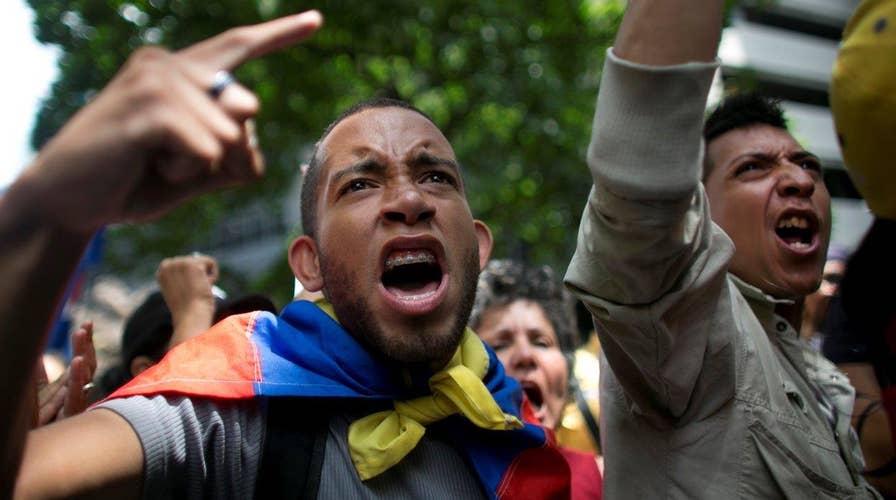Today, thirty million Venezuelans are forced to cope with a grave scarcity of food, medicine, electricity, and political freedom. As the humanitarian crisis worsens, many fear that seething social tension may explode into a bloody confrontation. President Nicolás Maduro seeks to hold on to power by defying the National Assembly and distributing weapons to militants who will use violence to defend the regime. Instead of bolstering urgent regional efforts to confront the crisis, the Obama administration inexplicably backed the regime’s bid to buy time—so the meltdown in Venezuela is the next U.S. president’s problem.
Since Maduro was elected by the narrowest of margins to succeed Hugo Chávez three years ago, Venezuela’s sputtering and debt-ridden economy has been in steep decline. Plunging oil prices and production compounded the government’s woes. The regime’s international credibility has been devastated by authoritative reports in U.S. and European dailies implicating then National Assembly president Diosdado Cabello and other regime leaders in drug trafficking and money laundering. Last November, the arrest of Maduro’s stepson on cocaine smuggling charges in the United States scandalized Venezuelans. That December, Maduro’s destructive economic policies, political repression, and insecurity touched off a political avalanche, garnering the opposition two-thirds of the seats in national legislative elections.
Maduro’s response was to pack the supreme court with cronies who nullified every act of the assembly—including an amnesty of political prisoners. Electoral authorities are doing Maduro’s bidding by stalling a “revocatory referendum” that, if held this year, would allow voters to oust the president and elect a replacement.
Were it not for the dramatic humanitarian crisis, Maduro might be able to escape responsibility for this power grab. However, the imminent economic collapse and fear of widespread political violence has led the region’s chief diplomat, Luis Almagro, Secretary General of the Organization of American States, to call an urgent meeting to press regional governments to respond to the crisis.
President Obama has confronted Maduro’s abuses only when pressured by the U.S. Congress, because he believes that U.S. actions will raise nationalist ire. However, one would think he would support Almagro’s multilateral efforts to rally the region to address Venezuela’s unrest before it grows more dangerous. Instead, over the weekend, Secretary of State John Kerry risked prolonging the crisis by endorsing an ill-fated “political dialogue” mediated by Spain’s leftist ex-president José Luis Rodriguez Zapatero. The opposition already has rejected such a dialogue, and the National Assembly has declared that Maduro’s unconstitutional actions and efforts to evade a referendum on his presidency justify a formal invocation of the OAS Inter-American Democratic Charter.
U.S. diplomats must have known that Kerry’s endorsement of a dialogue hosted by Maduro’s friends would blindside the opposition and undermine Almagro’s plea for action. Now that the opposition has ruled out such mediation, it remains to be seen whether U.S. diplomats will continue to duck the Venezuela issue or urge countries to confront Maduro’s anti-democratic measures and launch a diplomatic rescue mission.
Even those in the chavista base and in the military who oppose Maduro’s irresponsible leadership and Cuban interference might welcome a clear signal that Venezuela’s neighbors will not stand by as Maduro and his narcogenerals take the country into an abyss.
An OAS resolution might also call on the executive branch to respect the constitutional rights of the National Assembly to grant an amnesty to political prisoners and to authorize a revocatory referendum; permit independent election monitors; cease the distribution of weapons to irregular forces; and allow the private sector to mitigate the shortage of food, medicine, and electricity. The OAS also could pledge to organize international humanitarian relief efforts.
Meanwhile, a U.S. indictment of Cabello and other officials for drug-trafficking as well as executive sanctions on those who are violating constitutional norms and human rights would dispel justified doubts about where Washington stands on democracy and the rule of law in Venezuela. It’s never the wrong time to do the right thing.

